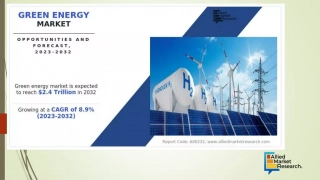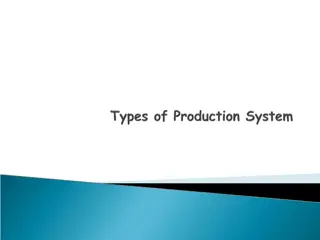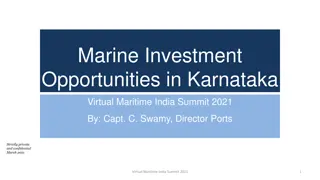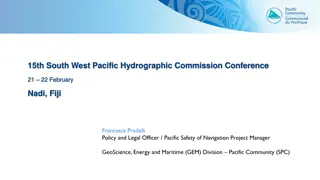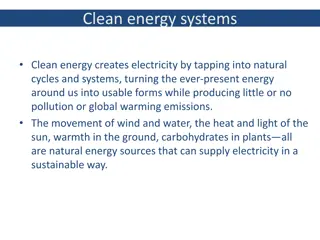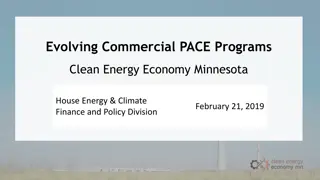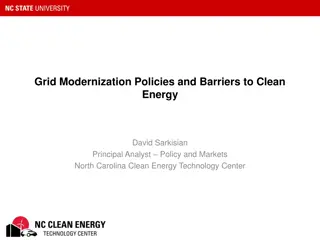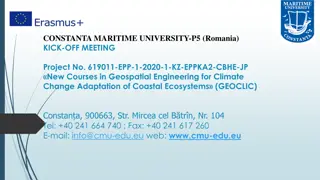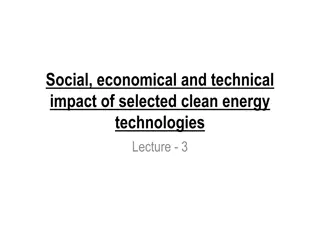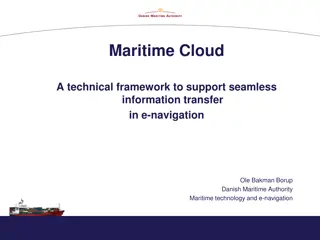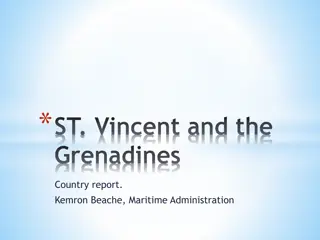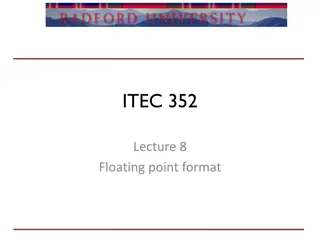
Innovative FPSO Systems in Offshore Oil and Gas Industry
FPSO systems are floating vessels used in offshore oil and gas industry for crude oil production, storage, and offloading. Introduced in the 1970s, FPSO systems are environmentally friendly, reducing hazards and harmful substances. They operate in deep water fields, minimizing environmental degradation compared to traditional fixed platforms.
Download Presentation

Please find below an Image/Link to download the presentation.
The content on the website is provided AS IS for your information and personal use only. It may not be sold, licensed, or shared on other websites without obtaining consent from the author. If you encounter any issues during the download, it is possible that the publisher has removed the file from their server.
You are allowed to download the files provided on this website for personal or commercial use, subject to the condition that they are used lawfully. All files are the property of their respective owners.
The content on the website is provided AS IS for your information and personal use only. It may not be sold, licensed, or shared on other websites without obtaining consent from the author.
E N D
Presentation Transcript
Introduction The safety of the marine environment is essential and vital to achieving sustainable economic development of every nation. It is in recognition of this fact that the need to protect and safeguard the environment has become the prime focus of every State. Over the years, measures have been developed and put in place to tackle pollution and unsafe navigable water that may result from oil exploration, production and other related activities within the oil and gas industry and ensure that negative impact on the environment is minimized and/or totally eliminated. One of the innovative introductions in the oil and gas industry is the Floating Production Storage and Off-loading (hereinafter FPSO) systems which replaced the huge steel fixed platform that is often difficult to decommission completely at the end of production.
Floating Production Systems The FPSO Systems are floating vessels used in the offshore oil and gas industry for production of crude oil, storage and offloading of distilled product from crude raw material, through cargo containers or pipelines built underwater. They are anchored to a number of mooring systems which holds it in place with the capacity to allow it to rotate freely in order to adapt to changing weather conditions. It gathers hydrocarbon through subsea wells which are transported up in- field pipelines to the vessel s turrets and onwards to the Floating Production System s surface where the processing paraphernalia is situated. The oil then processed is either transferred through a loading hose to shuttle tankers, other vessels or pipelines while gas is usually transferred to shore by pipelines, injected into a reservoir to store and save it when it cannot be transferred to shore or re-injected into the field to boost production.
The FPSO System is suitable for deep water and ultra-deep water fields. It is used on more than 120 offshore fields and about one quarter of the units are operating off Northern Europe, Brazil and others are mostly in the Gulf of Mexico, off China-Southeast, Asia, West Africa and Australia. The FPSO System is an environmental friendly innovative measure which was introduced in the 1970s in a bid to protect the environment from hazardous and harmful chemical substances that results from the production/processing of hydrocarbon petroleum products and to minimize and fundamentally avert any unwanted discharges and spillage. They have been successfully utilized for almost five decades and are well fitted with advanced technological equipment and facilities for the production of crude oil (extracted from the earth s sedimentary basins), storage and transmission of the refined products through pipelines to tank farms or tanker vessels.
The FPSO System is unlike the traditional fixed oil production platform which is marred with environmental degradation which often lead to the discharge of by-products and chemicals from the drilling paraphernalia into the environment. Associated gas discovered in the process of exploration were flared rather than been re-injected into the ground and as such significant amount of several poisonous chemicals such as nitrogen dioxides, sulphur dioxide, benzene, toluene, hydrogen sulphide among others are released into the environment and this has gravely contributed to global warming and climate change. The FPSO System has proven to be a reliable and cost-effective solution for the development of offshore fields in deep waters of more than 1,000m depth.
There are variants of Floating Production Systems and each of these platforms has unique advantages and disadvantages that drive their popularity. These Platforms are as follows: Floating Production Storage and Offloading Vessel which serves both as a petroleum processing and storage facility for produced hydrocarbons. This is the most popular of all floating production systems. Tension Leg Platforms are attached to the seabed by vertical members called tendons and its motion characteristics allows wells to be completed on its deck. Production Semisubmersibles Spar platform, or deep-draft caisson vessel (DDCV) which has a deeply submerged, spar-shaped hull and a deck structure. Just like Tension Leg Platform, it is possible to put Christmas trees of wells on the platform deck, and like FPSO, oil storage capability can be incorporated in the hull, making this type attractive at isolated deep water locations
Advantages of Floating Production Systems The oil and gas exploration and production activities in deep sea are now on a steady increase globally. The benefits of the Floating Production Systems are as follows: They can be safely utilized in ultra- deep water. For instance, a number of fields in the ultra-deep water of the Gulf of Mexico which are remote from existing pipeline infrastructure can utilize the advantage of floating production systems rather than the use of shuttle tankers as a transport solution for transporting oil produced on the Fields in the Gulf of Mexico. They are useful in developing fields which would otherwise have been economically off limits to fixed platforms.
They are easy to remove and re-use as they can be disconnected from their moorings after use. They are cheaper as they are detachable and reusable for another field. Hence, the value is retained unlike the fixed Platforms which require huge capital expenditure and engagement of professional experts for its decommissioning which may entail leaving behind some disused steel at sea and this poses danger to safety of navigation. They are adapted to suit water depths and adverse weather conditions (cyclones and hurricanes inclusive). Hence, it is possible to drill in the harshest weather conditions once the system is so adapted.
The environmental effects or impacts are not appalling as they are not permanently affixed to an area. After exhaustion of the resources, they can be relocated and marine life in that area will gradually regain balance. Negative environmental impact which may affect marine life (such as spillage during leaks from wear and tear or pipeline vandalism from saboteurs or rebel groups) is reduced as it dispenses with the need to build, inspect, maintain and repair pipelines.
Disadvantages of Floating Production Systems Some of the drawbacks of the Floating Production Systems are as follows: The existence of an effective system of tackling challenges still gives room for human error and most spillages that occur as a result of the use of floating production systems are attributed greatly to human error. In respect of coastal environments, there will be increase in erosion rates, sediment re-suspension and turbidity caused by vessel transits in coastal areas
The anchoring, structure placements and pipe laying will have adverse effects on the topographic features, plankton and deep benthic communities. It could bring about forced migration and recolonization of the underwater habitat. Installation, routine operations, and decommissioning activities for the Floating Production Systems components could cause impacts on air quality, marine and coastal environment and could potentially affect commercial fisheries. There is the possibility of marine creatures colluding with the vessel or any of its paraphernalia and their ingestion of solid debris accidentally lost overboard.
Adverse impacts on marine life generally as the emissions, noise and visual interruptions from the attendant technology necessary for developing, maintaining and utilizing the structure would amount to an imbalance of its natural environment. Oil spills from the operations of platforms (Fixed and Floating) could cause adverse impact on water, ambient air and sediment quality. A key illustration is the North Sea oil spillage. In 2011/2013 Shell and other oil majors have continued to spill crude, diesel and other contaminants into the North Sea. Precisely, in August 2011 oil giant Royal Dutch Shell s Gannet Alpha platform located in the North Sea caused a major leakage of around 1,300 barrels of oil into the North Sea.
Another classical example is the BP Gulp of Mexico oil spill in 2010, the oil drilling rig platform Deepwater Horizon On April 20, 2010, the oil drilling rig Deepwater Horizon, operating in the Macondo Prospect in the Gulf of Mexico, exploded and sunk leading to the death of about 11 workers on the Deepwater Horizon. Four (4) million barrels of oil flowed from the damaged Macondo well over a period of 87-days before it was finally capped on July 15, 2010. The spillage had resulted in considerable damage to the deep-sea corals and other ecosystems. While an exact sum cannot be placed on the cost implications of the spill, it was reported that BP had spent over $44 billion so far in clean-up costs, fines and settlements. BP has estimated that the pre-tax cost of the 2010 Deepwater Horizon explosion and oil spill on the Gulf Coast would amount to a total $61.6 billion. Vessel traffic is increased near its location because of the necessary shuttle tankering operations. This could lead to challenges in navigation and possibilities of collision.
The Floating Production Systems allows for easy removal and decommissioning of the production platform unlike the fixed production platforms which are difficult and nearly impractically to decommission. Fixed production platforms have the tendency to affect maritime activities as it could lead to interference with navigation, fishing and/or conservation of the living resources of the sea. The likely resultant damage of these fixed platforms lead to the United Nations Convention on the Continental Shelf 1958 which provided that all installations which have been abandoned or disused must be entirely removed. Overtime it was realized that it was difficult to meet the complete removal requirement of the Convention and as such it became imperative for the United Nations to revisit the issue of redundant installations which led to the 1982 Convention on the Law of the Sea (UNCLOS) which stipulates that any installations or structures which are abandoned or disused must be removed to ensure safety of navigation, taking into account any generally accepted international standards established by competent international organization.
It further states that such removal shall also have due regard to fishing, the protection of the marine environment and the rights and duties of other states. It also provides that appropriate publicity must be given to the depth, position and dimensions of all installations or structures not entirely removed. The coastal state where necessary may establish reasonable safety zones (500 metres) around such artificial islands, structures and installations to ensure safety of navigation and such installations. Due regard must be given to recognized sea lanes essential for international navigation and free passage of vessels (Article 60). Essentially these structures/platforms should be within the Exclusive Economic Zone (200 nautical miles) and Continental Shelf (limit of 350 nautical miles) of a coastal state from the baseline from which the breadth of the territorial sea is measured.
The coastal state exercises sovereign rights to exclusive economic exploitation and exploration of the zones for energy and marine living (eg fishing) resources (Parts 5 & 6, Articles 55-85 of UNCLOS). It is equally notable that the International Maritime Organization (IMO) as part of its function which includes ensuring maritime safety and efficient navigation introduced Guidelines and Standards for the Removal of Offshore Installations and Structures on the Continental Shelf and in the Exclusive Economic Zone (IMO Guidelines). Other International Conventions also worthy of note includes the International Convention on Civil Liability for Oil Pollution Damage 1992 which though related to oil pollution from ships following incidents such as the Amoco Cadiz oil spill (16 March, 1978) have implications for off-take vessels operating from platforms.
It is imperative therefore that floating production systems must give due regard to these various international conventions which have been adopted by the coastal state as a member of the Comite of Nations. Nigeria being a coastal state and necessarily implemented these conventions into its domestic legislation under its Merchant Shipping Act, 2007 e.g Sections 215, 216, 335 and 336. Equally, the processes for decommissioning or terminating their activities must take cognizance of them so as not to obstruct international shipping and maritime operation. Recently, Energy giant Royal Dutch Shell has released details of how it intends to decommission the Brent oil field known as Brent Alpha .
This project will be the first major North Sea decommissioning project and same is capital intensive. Shell is however planning of leaving parts of the structures in place, including the concrete and steel feet and this has raised concerns among environmental groups such as Scotland s environmental NGOs including World Wildlife Fund (WWF) and Greenpeace calling for a complete restoration of the marine environment to its original state once a field is depleted. These groups have also raised huge concerns that the structures may potentially become polluting materials. There are also considerations towards utilizing the floating platform after decommissioning by converting them into floating wind turbines to provide green/renewable energy which is a fast-developing concept in energy generation for coastal oil producing states.
Conclusion The Floating Production Systems is a laudable development in the oil and gas industry. It has proven to be a breakthrough in the offshore oil and gas sector given the solution it has provided to the myriads challenges in the offshore oil and gas sector. In consideration of the above, it could be argued that though the Floating Production Systems have its disadvantages, its ability in developing deep water oil fields and safe storage and transportation of oil produced with little contamination to the marine life is a commendable innovation that ensures the protection of the marine environment and ecosystem. It can also be said to be a remedy or panacea for maritime operations especially with respect to international shipping.
Thank Thank you you for for your your attention attention. . L. Chidi Ilogu, SAN L. Chidi Ilogu, SAN
References 1. Bensimon, L. F., and Delvin, P. V. (2001). "Technology gaps and preferred architectures for deepwater FPSOs." Offshore Technology Conference, OTC 13088, Houston, May. 2. Deborah Cranswick and Hammond Eve, MMS Floating Production, Storage, and Offloading Systems: Environmental Impact Statement Results and Record of Decision. 3. Henry D., and Inglis, R. B. (1995). "Prospects and challenges for the FPSO." Offshore Technology Conference, OTC 7695, Houston, May. 4. Hollister, H. D., and Spoke, J. J. (2004). "The Agbami project: A world class deepwater development." Offshore Technology Conference, OTC 16987, Houston, May. 5. S. Tanaka, Y. Okada, Y. Ichikawa, (2005), Offshore Drilling and Production Equipment in Civil Engineering. 6. Torgeir Moan, Jorgen Amdahl, Xiaozhi Wang and Jack Spencer - Risk Assessment of FPSOs with Emphasis on Collision. 7. Zhang D., Chen, Y. & Zhang Journal of Marine Science and Application (2014) Volume 13, Issue 1, pp 67-75 8. Anish Marine Insight What is FPSO (Floating Production Storage and Offloading) System? 9. James R. McCaul Floating Production Systems Provide a Capability to Produce Deepwater and Remote Fields June 11, 2001 Oil and Gas Journal. 10. DeSmog UK - Clean Energy VS Clean Seabed: Should Oil and Gas Companies Have to Leave the North Sea as They Found it? 11. Oil and Gas Law Current Practice and Emerging Trends by Greg Gordon and John Paterson (2008).

